
The effects of COVID have been wide-reaching in the mortgage business, some positive, some negative.
While some lenders have changed their own rules, often referred to as overlays, the one thing that has not changed is the regulations set forth by FHA.
FHA is still providing financing for borrowers with scores as low as 580, you just need to know where to find the right lender who is still operating without overlays.
In this article, we will explore what lenders are looking for when determining if you qualify for an FHA loan.
Rate Search: Check Today’s Mortgage Rates
How to Qualify for an FHA Loan
Overall your qualification will be dependent upon 3 things; credit, income, and assets.
Ultimately your lender will run your file through Fannie Mae’s automated underwriting system, or as it’s commonly called DU. This system will read the whole picture, credit, income, and assets, along with everything in between.
Having strength in the income or asset category will definitely improve your chances of approval, especially if you are working with scores that are on the lower end of the spectrum.
Speaking with an experienced loan officer who works for a bank operating without overlays is your first step to putting yourself in a position to qualify for a new home.
2020 FHA Loan Requirements |
|
Credit Scores
- Some FHA lenders have increased their credit score requirement from 580 to 620
- Most lenders are no longer offering FHA loans with 10% with a credit score below 580
- If your score is under 620 work on improving your credit score before applying
Recent reports from Fannie Mae show the average borrower credit score has been steadily increasing this year. This means that lenders aren’t lending to borrowers with lower credit scores like they have the last few years.
FHA loans require a 500 credit score with a 10% down payment, with a 580 credit score you need a 3.5% down payment.
FHA does offer loans to borrowers with a 500 credit score. However, in the financial climate, we are in at the moment it will be next to impossible to get approved for an FHA mortgage with a credit score below 580 unless you have a 20% down payment and a low debt-to-income ratio, or other compensating factors.
Compensating Factors |
|
Many FHA lenders that could approve FHA loans with a 580 credit score before COVID are now requiring a 620 score to qualify. Ideally, you will have some time to improve your credit score before applying. For tips, read our article on how to increase your credit score by 100 points in 30 days.
Income and Assets
- The maximum DTI ratio with FHA is 50%
- Borrowers with a 580 to 620 credit score may need a DTI ratio below 45%
- Have at least three months worth of mortgage payments in reserves
Lenders are worried about borrowers either having a reduction in income or becoming unemployed altogether. If you have bounced around different jobs in the last couple of years it will be more difficult to get approved.
To qualify for an FHA home loan, borrowers need to have a maximum debt-to-income ratio of 43%. However, if your credit score is below 620 lenders may want your DTI ratio to be no higher than 36%.
You can’t deplete your entire savings when you get a mortgage. Lenders want to see that you have enough cash reserves in savings to cover the next three mortgage payments.
The Housing Market is Picking Back Up
2020 has been a crazy year in most industries and the housing market was one of the hardest hit.
These increased requirements have made it more difficult to get approved for a mortgage and the housing market took a hit because of it.
But lenders have started to relax their loan requirements in the past couple of months. That coupled with historically low-interest rates has fueled a rebound in the buying market.
If you’ve been putting off buying a new house due to the pandemic, now is the time to start looking again because the housing market is picking up fast and rates are low.
Are you ready to see if you qualify?



